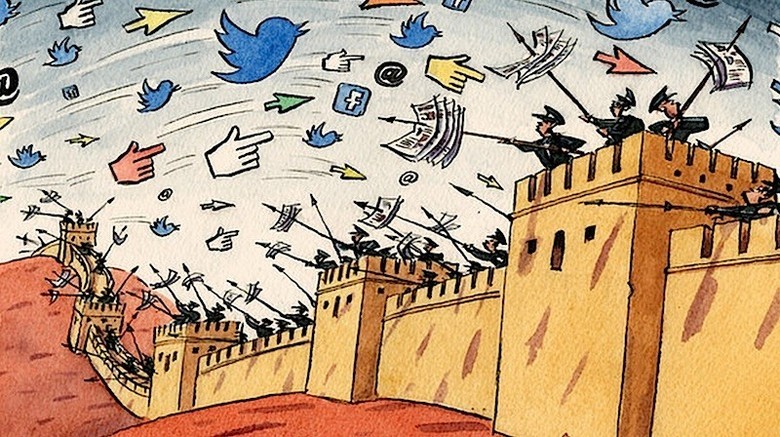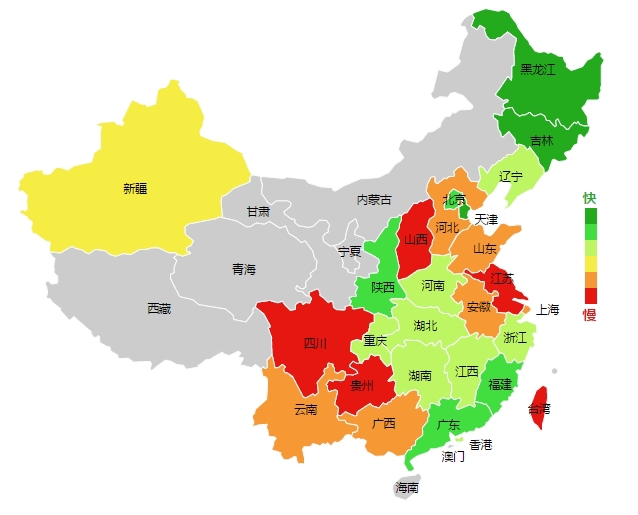Internet around the world: China

We are continuing the series of publications on the Internet around the world, and this time the focus of attention is on the country where 17% of all humanity lives - China.
This country today is more persistently manifesting itself as a new superpower challenging the leadership of other countries. The huge population, uneasy and controversial recent history, rapid urbanization and industrial development, as well as a bizarre, but working symbiosis of capitalism and communism, have an impact on the spread and use of the Internet in the country. In addition, we must not forget that for 68 years now Taiwan (Chinese Republic) has been going its own way, about which we will also talk here - after all, this is part of the Chinese nation.
Chinese National Top Level Domain - .cn. Formally, the Internet appeared in the country in 1994, with the first cable connection at the Institute of High Energy Physics of the Chinese Academy of Sciences. And its commercial distribution began in 1995, when China Telecom began providing access in Beijing and Shanghai through two channels at 64 Kbps. In 1997, there were 620 thousand users in China, and at the end of 2011 - 513 million. As of the summer of 2016, the number of Internet users was estimated at 710 million people . Of these, 656 million use the mobile Internet. For comparison, today the population of the country is about 1.3 billion people, the population of Russia is 146 million people.
')
The main national search engine is Baidu . Although Google, and Yahoo !, and Bing are trying to gain a foothold in the Chinese market, but the size of their audience is many times smaller. Also among the largest Chinese resources are Sina and Sohu news sites, Taobao marketplace, Tmall and JD online stores. The main national social networks are Weibo and Zhihu . There are also their own “replacements” of Wikipedia - Baike and “ Bidupedia ”.
A regular user cannot optionally register a domain in the Chinese segment: this requires a business license . But despite this, the number of Chinese sites is rapidly increasing due to the huge population.
It is possible to connect broadband Internet in China without problems, it is enough to come with the passport to the office of the provider company. However, the Internet itself is very cheap: on average, $ 20 per month . But even having forked up on the high-speed tariff, you can easily get the speed several times lower: instead of the paid 10 Mbit / s. will have to "enjoy" 1.5 Mbit / s. Mobile Internet is still worse: speed is lower and prices are higher. For example, China Telecom offers 300 MB per month for 50 yuan. Life hacking of all travelers - connecting to free public Wi-Fi - will not help you much either, due to the extremely low speed. Perhaps partly for the reasons described above, Internet cafes that are found at every corner are very popular in China.
The Golden Shield Project and Censorship

When it comes to the Chinese Internet, the first thing that comes to mind is the Great Chinese Firewall (“Golden Shield”). In fact, it is a system for filtering Internet traffic at the level of main channels, which the Chinese segment of the network is connected with the rest of the world. The development of the Golden Shield began in 1998, and in 2003 it was commissioned. In fact, it serves as a tool for censoring and protecting against external attacks on Chinese online resources. Details of the architecture and technical implementation, for obvious reasons, were not disclosed. First of all, the firewall is a tool for censorship:
- Chinese users do not have access to a number of foreign sites that the authorities consider inappropriate or harmful. Filtering is carried out on the basis of a black list and by keywords. In the first place, they block / filter:
- sites criticizing the Chinese authorities and the communist period in Chinese history;
- websites promoting the development of freedom of speech in the country;
- pornographic sites;
- sites that distribute some religious and philosophical teachings.
- Sites hosted on the territory of the People's Republic of China, without special permission, are not entitled to refer to news from foreign sites or reprint them.
Generally speaking, Chinese Internet censorship has a rather rich history. For example, for several years, access to Wikipedia is periodically blocked in the country. The official reasons are different, but most often the “people's encyclopedia” is banned for articles that express disagreeable points of view to the authorities on various areas of life, politics and history of China. Also, without a VPN, you are unlikely to go to Gmail, Facebook, Twitter, Youtube and many other popular resources in the world.
It is curious that even if a foreign site is not blocked by the Golden Shield, this does not mean that it will be available throughout China: different filtering rules may apply in different provinces. This is also reflected in the access speed: in different regions of the country you will have very different speeds when accessing the same resources. Especially bad in China with outgoing traffic, as a rule, it barely creeps. In addition, the overall speed of the Internet can be greatly influenced by the time of day - in the daytime and evening time, residents most actively use the network.

By the way, due to the work of the national firewall, access to foreign sites can be very slow, unlike resources hosted in China.
One of the tools of censorship in the Chinese segment of the Internet is devood . This is a large contingent of bloggers who, for a small bribe from government agencies, distribute online, in forums, chats and blogs, information and comments in support of the actions of the authorities. In 2008, The Guardian counted about 300,000 such bloggers in China .
In general, it may seem that there is no idle censorship on the Chinese Internet, everyone goes along the line and uses only resources approved by the Communist Party. But in reality it is not. The main thing is to avoid discussing the most painful political issues so as not to attract the attention of the “organs”. A couple of years ago, Harvard researchers conducted a series of experiments, and found that Internet censorship in China is far from total .
Numerous blocking sites are managed using a VPN. It's funny that Fan Binsin , one of the key developers of the Golden Shield, had to resort to this procedure during an information security report at the Harbin Polytechnic Institute: wanting to show listeners to one of the South Korean websites, he discovered that it was blocked, and promptly picked up on his VPN computer to bypass protection. However, not all VPNs are equally useful: depending on the specific province, certain services may be helpless. Although all the above difficulties with circumventing locks are not too disturbing for the Chinese themselves: the country has created enough national services that replace all imaginable foreign analogues, which the inhabitants of the Middle Kingdom prefer to use.
However, it is possible that Internet censorship in China has begun to tighten. From December 1, 2016 began to monitor online broadcasts and streaming traffic. And at the end of December, there was news about the tightening of China’s cybersecurity strategy . A new law should be adopted in the summer of 2017. According to its provisions, foreign IT products will be meticulously researched by government agencies. Internet companies and Chinese media will be required to independently monitor the quality of published information. Placing of false information on the network can haunt a real prison sentence.

Tightening the screws in the Chinese segment of the Internet and touched the scope of augmented reality games. In particular, the scandalous game Pokemon GO was banned . By the way, the game has never actually worked in China before, because it depends on some Google services that are blocked by the Golden Shield. However, users managed to avoid obstacles. Now Pokemon GO is officially banned. The voiced reason: the game carries the threat of "geographical information security", transport security, as well as the life and health of people. There are fears that in China all augmented reality games will be banned altogether.
Behind the strait
On tiny Taiwan, with the Internet, it's not freer than an example. The country, whose population today is only about 24 million people, has become one of the “ Four Asian Tigers ” - the basis of its economic power is the development of high-tech high-tech industries and the industry as a whole.
Unlike mainland China, Taiwan does not have so many painful political and social topics. For example, in the PRC, they censor and avoid mentioning the very fact of Taiwan independence. In addition, since 1949, when supporters of the Kuomintang party fled to the island, the survival and development of the small Taiwanese state sharply depended on the development of science and cooperation with the world. So if censorship exists in Taiwan, then it definitely does not apply to the Internet: here you can go to any sites and find any information, including about China’s actions in relation to Tibet, about the “excesses” of the times of the Cultural Revolution and unrest in Tiananmen Square .
Source: https://habr.com/ru/post/401021/
All Articles